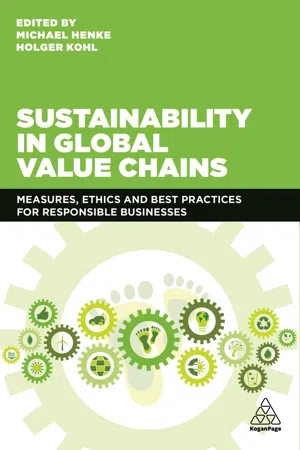
Sustainability in Global Value Chains
Measures, Ethics and Best Practices for Responsible Businesses
- English
- ePUB (mobile friendly)
- Available on iOS & Android
Sustainability in Global Value Chains
Measures, Ethics and Best Practices for Responsible Businesses
About This Book
Sustainability can create greater efficiency and cost savings in the supply chain. Supply chains, which are more complex and global than ever before, are full of both risks and opportunities. The risks range from inconsistent or poor quality, supply disruptions and health and safety concerns, to corruption. Businesses face pressure to adopt sustainable supply chain practices from various stakeholders and motivations typically come from one or more of four sources: customers, compliance, costs, competitive advantage. Sustainability in Global Value Chains is the guide to understanding all aspects and approaches of sustainable supply chains using in-depth research from leading academics from sixteen different universities. Sustainability in Global Value Chains focuses on how to make supply chains sustainable, with an emphasis on new technologies and digitization. The research featured covers topics such as KPIs in production and supply chains, the role of standards, blockchain technology and algebraic models. This comprehensive book presents real world issues, problems in implementing sustainability in the supply chain and examples of best practice.
Frequently asked questions
Information
Ethical principles of sustainable value chain management
References
- Global Witness (2013) Breaking the links between natural resources and conflict: The case for EU regulation: A civil society position paper, Global Witness
- Handfield, R, Walton, SV, Sroufe, R and Melnyk, SA (2002) Applying environmental criteria to supplier assessment: A study in the application of the Analytical Hierarchy Process, European Journal of Operational Research, 141 (1), pp 70–87
- Hofmann, H, Schleper, MC and Blome, C (2018) Conflict minerals and supply chain due diligence: An exploratory study of multi-tier supply chains, Journal of Business Ethics, 147 (1), pp 115–41
- Lobel, O (2006) Sustainable capitalism or ethical transnationalism: Offshore production and economic development, Journal of Asian Economics, 17 (1), pp 56–62
- Miletto, M, Caretta, MA, Burchi, FM and Zanlucchi, G (2017) Migration and its Interdepencies with Water Scarcity, Gender and Youth Employment, United Nations Educational, Scientific, and Cultural Organization, Paris
- Rotter, JP, Airike, P-E and Mark-Herbert, C (2014) Exploring political corporate social responsibility in global supply chains, Journal of Business Ethics, 125 (4), pp 581–99
- UNESCO WWAP (2019) [accessed 23 September 2020] Leaving No One Behind: The United Nations world water development report 2019, UNESCO [Online] https://unesdoc.unesco.org/ark:/48223/pf0000367306 (archived at https://perma.cc/EPT3-ETTX)
Start-ups as relevant supporters and initiators of sustainability attributes in global value chains of the future
Introduction
How will sustainable start-ups have a noticeable influence on global value chains or supply chains in the future?
Framework
Asymmetric partnerships between start-ups and SMEs: A predetermined breaking point
Table of contents
- List of figures and tables
- About the contributors
- Preface
- Acknowledgements
- List of abbreviations
- 01 Introduction: About the book Michael Henke, Holger Kohl and Denis Daus
- 02 The importance of supply chain management for sustainability in global value chains Holger Kohl, Michael Henke and Denis Daus
- 03 Interdisciplinary research work in the field of SSCM Michael Henke, Holger Kohl and Denis Daus
- Part One Ethical principles of sustainable value chain management
- 04 Start-ups as relevant supporters and initiators of sustainability attributes in global value chains of the future Stephanie Rabbe, Christoph von Viebahn and Marvin Auf der Landwehr
- 05 Global value chain sustainability governance: Implications for management research and practiceKlaus Fischer
- Part Two Measuring sustainability in global value chains
- 06 Sustainability controlling in integrated value chains Harry Müller
- 07 Measuring diversity among competing supply-value chains Kristan A Schneider
- 08 Sustainable buyer behaviour in value chains: Determinants and marketing implications Guido Grunwald and Valérie Swaen
- 09 Tactical planning measures for sustainable and efficient international transportation networks Michael Dircksen
- Part Three Actions to continuously improve sustainability in global value chains
- 10 Biomimetic principles for improved organizational information processing: Toward sustainable supply chains Lydia Bals
- 11 (How) Can research in the field of sustainable supply chain management become more forward-looking and future-shaping? Carsten Reuter
- 12 Success factors of voluntary sustainable supply chain management sector initiatives Julia Schwarzkopf, Klaus Fischer and Martin Müller
- 13 An institutional framework of urban logistics: Policy options and the role of the government Marcus Sidki and Igor Ivanov
- Index